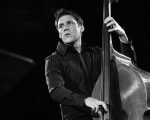As one who has written about jazz in a variety of publications, from periodicals to books, I’ve had many occasions to hear musicians’ various criticisms of those who by profession or sidebar occupation most often stand in published “criticism” of them – be that favorable or unfavorable. I’ve had my share of back-and-forths with artists over things I’ve written and heard stories of the same from writing colleagues and musicians. And over the last 18 months the Independent Ear has hosted an ongoing series of dialogues from African American music journalists on the often peculiar challenges we face in covering music and artists.
With all that in mind, and with a university presentation forthcoming on the subject of jazz journalism/criticism (and perhaps next we’ll explore the differences between journalist and critic), I took a recent informal poll of a group of prominent jazz artists. The question/premise was a simple one:
WHEN YOU READ MUSIC JOURNALISM/CRITICISM WHAT QUALITIES ARE YOU LOOKING FOR IN THE WRITER AND THE WRITING?
The question elicited a number of responses, some quite provocative, some quite expansive – one in particular, from an acknowledged master, drew two essays in response. For the next few weeks the Independent Ear will feature those responses in an ongoing series, in alphabetical response form. Full disclosure: in certain cases these musician-respondents may respond directly to my own writing and work, however let me assure the reader that such references were totally unsolicited and spontaneously supplied by the respondent.
Ben Allison, bassist-composer-bandleader:

The best music journalism, in my opinion, does the following things
1. Gives insight into a piece of music by offering observations about it in the context of the current music scene: how does is reflect what’s happening now in a broad sense? Where does it fit in terms of larger musical trends vs. the local trends both in time and geography?
2. Gives insight into a musical work in the context of the artist’s history: how does it fit in the overall story that the artist has fashioned over their personal career? An example would be the career of Miles. How does “On the Corner” fit in with his work with Bird, the band with Trane, the mid-60s quartet?
This is not just a simple matter of “this is good, this is bad,” or “I like this, I don’t like that.” As a reader and musician I usually don’t put too much stock in whether a reviewer likes a record or concert. I’m mostly curious to know something about the music: who played what tunes with what instrumentation? Also, whenever possible, I like to get some sense of context: what’s different or even unique about a particular band or artist being reviewed? In other words, tell me where you think this music falls in the overall scene. Was it a successful performance? If so, why? Judge it on it’s own terms and in the context of what the musicians were going for. Would you judge a Woody Allen movie based on it’s use of special effects, a porno based on it’s crafty dialogue?This has to be done with some sense of flair and sophistication. Writers will often try to put someone in context by comparing them to well-known musicians. I can’t tell you how many times I’ve been compared to Charles Mingus or Dave Holland. And while these two musicians are among my favorites of all time, and I feel humbled to be put in the same sentence, I often feel like it’s a bit of a short cut on the part of the writer. I mean, is there a jazz bassist alive who hasn’t been influenced by these guys? I’m a bassist/composer/leader. They’re among the greatest bassist/composer/leaders of all time and therefore, among the most recognizable names. It sometimes feels a little obvious. I’m wondering how many writers know about my love and admiration for Willy Weeks and Chuck Rainey, both of whom figure very largely in my sound and approach.
I don’t mean to suggest this should be a guessing game for journalists (i.e “spot the influence”). I’m only saying that my favorite writers are the ones who look for connections (even if they’re a bit off-base) and search for context. And I really love it when writers compare my current work to my earlier work! Judging my music in the context of my personal history.
On the negative side, my LEAST FAVORITE meme (cultural idea that spreads between people) is that jazz and jazz musicians are downtrodden. There’s a romanticism to this idea. But it’s been beaten to death and I, for one, don’t want to continue to celebrate it. Most of the musicians I know are hard-working, middle or lower-middle class people who see themselves as small business people. Their brands are their names and what they sell is their art. They have as much integrity as any hard working craftsman. We’re not to be pitied. I don’t want to dwell on the fact that Billie Holiday supposedly died with $700 strapped to her leg or that Robert Johnson died at 27. Both stories are sad but miss the point. I’m mostly interested in how Robert Johnson’s voice and guitar cracked with emotion that speaks to generations of people. I know I’d understand Robert Johnson more deeply if I knew how things smelled and sounded and tasted in the Mississippi delta (I’ve never been). A good writer would help me, at least a little, to feel like I’m there.

BEN & MEMBERS OF ONE OF HIS BANDS
www.benallison.com
Bill Anschell, pianist-composer-bandleader-humorist

I haven’t decided NOT to read reviews of my music, but I decided long ago that I wouldn’t let myself off the hook by taking praise seriously and discounting criticism as flawed. And the best way I know to pull that off is to not take pros or cons at face value, but to see if there might be some meat within. What do I look for in the writing? Probably like most musicians, I want some evidence that the writer can get inside the music – hear harmony, form, changes, rhythm – and not just react emotionally. Not that there’s anything wrong with the latter, but a more studied opinion is more valuable to me. One way critics of my music get my attention is if they zero in on something that I happen to agree with – maybe their favorite track is the same as mine, or they like a particular solo by someone in that band that I also especially like, or they find fault with something that I know deserves it. Obviously that’s a little self-centered (“if they hear what I hear, they must be good”), but knowing they’re on approximately the same page as me makes me very interested in the rest of what they have to say.
Generally speaking, I think the grade inflation/cheerleader aspect of reviewing has gotten way out of hand. When 90% of the reviews are positive, you know the writers aren’t digging deep enough, and their opinions consequently begin to lose meaning.
You don’t need to be trained in music theory to be able to hear changes, form, rhythmic complexity, etc. I have no doubt that you hear all of that (I can tell that you do), but I do think there are too many writers whose skills lie far more in the prose than in the listening. And some who don’t have a lot of either, sadly…
www.billanschell.com
Stay tuned to the Independent Ear for weekly explorations of artists’ expectations of music critics and journalists.
